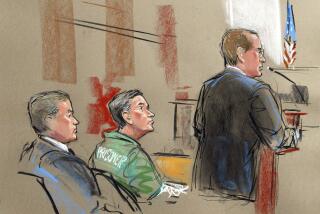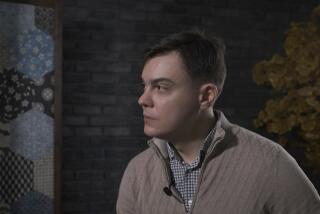KGB Agent Reportedly Flees to U.S. : Action May Have Sparked Recent Spy Defections
- Share via
WASHINGTON — A Soviet diplomat who was a high-ranking member of the KGB secret police has defected to the United States after disappearing in Rome last month, intelligence officials said Wednesday.
The fallout from the defection of Vitaly Dzhurtchenko, 50, will become apparent in the coming months, the intelligence sources predicted. And, although U.S. officials would not confirm it, a recent series of East-West defections may have been parts of a chain reaction set off by Dzhurtchenko’s decision to tell Western intelligence services what he knows about Soviet Bloc spies in their midst.
Dzhurtchenko, who held the rank of first counselor with the Soviet Foreign Ministry, was on temporary assignment in Italy when he dropped from sight Aug. 1 after telling Soviet security agents that he was going to visit Vatican museums.
CIA Debriefing
The intelligence sources, who declined to be identified, said that Dzhurtchenko had held a “significant rank” in the KGB hierarchy and possessed detailed knowledge of Soviet intelligence operations in the United States and elsewhere. He has been undergoing debriefing by the CIA somewhere in the United States for the last six weeks, they said.
Dzhurtchenko could be the highest-ranking KGB defector to the West since the 1930s, when two generals in the Soviet intelligence service fled Moscow during the purges of Josef Stalin. The Washington Times reported Wednesday that Dzhurtchenko was the No. 5 man in the Soviet secret police, although intelligence officials refused to confirm that.
Dzhurtchenko arrived in Rome on July 25 for what was expected to be about a 10-day assignment and stayed at the Villa Abamalek, the Soviet ambassador’s residence on the city’s western outskirts. On Aug. 8, the Soviet Embassy in Rome said he had disappeared a week earlier and asked Italian authorities to investigate.
London Defection
Shortly after Dzhurtchenko’s disappearance, three suspected Communist agents suddenly fled to East Germany from West Germany, where they had held sensitive government or political posts. The defection in London of a high-ranking Soviet spy followed.
On Aug. 19, a high West German counterintelligence official, Hans Joachim Tiedge, fled to East Berlin--touching off a diplomatically and politically damaging scandal for the Bonn government.
He was followed shortly by Herta-Astrid Willner, a secretary in the office of Chancellor Helmut Kohl, and her husband, Herbert Willner. He was an official of the Naumann Foundation, a think tank of West Germany’s Free Democratic Party.
Then, on Aug. 25, Martin Winkler, the No. 2 man in East Germany’s embassy in Argentina, defected to the West--possibly because he was a longtime West German agent who feared being exposed by Tiedge, sources in Bonn said.
And on Sept. 12, the British government announced that the chief of the KGB’s London operation, Oleg A. Gordievski, had defected. Gordievski had passed intelligence to the West since the 1970s, Danish and British officials said, but remained in place in the KGB, where he rose steadily in the ranks.
Acting on information provided by Gordievski, Britain expelled 25 Soviet citizens suspected of spying. The Soviet Union retaliated by expelling an equal number of Britons from Moscow, and a second round of expulsions followed that.
Other important Soviet defectors in recent years have included Anatoly N. Shevchenko, a Soviet Foreign Ministry official who turned himself over to the CIA in 1978; Stanislav Levchenko, a KGB major who fled the Soviet Embassy in Tokyo in 1979, and Viktor N. Korolyuk, a KGB major who defected in West Germany in 1981.
But none of them had the rank, or the apparent access to intelligence secrets, of Dzhurtchenko, intelligence sources said.
More to Read
Sign up for Essential California
The most important California stories and recommendations in your inbox every morning.
You may occasionally receive promotional content from the Los Angeles Times.














